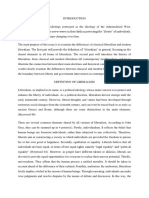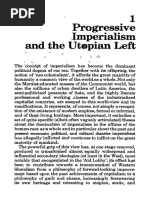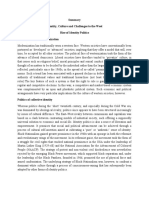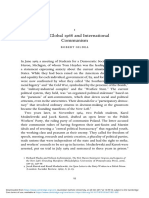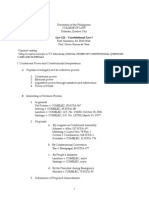End of Ideology
End of Ideology
Uploaded by
Nitesh SharmaCopyright:
Available Formats
End of Ideology
End of Ideology
Uploaded by
Nitesh SharmaCopyright
Available Formats
Share this document
Did you find this document useful?
Is this content inappropriate?
Copyright:
Available Formats
End of Ideology
End of Ideology
Uploaded by
Nitesh SharmaCopyright:
Available Formats
END OF IDEOLOGY
The idea of the end of ideology became fashionable in the 1960s and 1960s. After the Second World War politics in the West was characterized by broad agreement amongst major political parties and the absence of ideological division or debate. Fascism and communism had both lost their appeal, while the remaining parties disagreed only about which of them could best be relied on to deliver economic growth and material prosperity. To all intents and purposes, ideology had become an irrelevance. In the immediate postwar period, representatives of the three major western ideologies liberalism, socialism and conservatism came to accept the common goal of managed capitalism. This goal reflected an enduring faith in market economics, private property and material incentives, tempered by a belief in social welfare and economic intervention. In effect, an ideology of welfare capitalism or social democracy had triumphed over its rivals, although this triumph proved to be only temporary. The 1960s witnessed the rise of more radical new left ideas, reflected in a revival of interest in Marxist and anarchist thought and the growth of modern ideologies such as feminism and environmentalism. Finally, the end of ideology thesis focused attention exclusively on developments in the industrialized West and ignored the fact that in the 1950s and 1960s communism remained firmly entrenched in the Soviet Union, eastern Europe, China and elsewhere, and that revolutionary political movements were operating in Asia, Africa and parts of Latin America.
You might also like
- Casals - 2019 - Anticommunism in 20th-Century Chile From The "SocDocument30 pagesCasals - 2019 - Anticommunism in 20th-Century Chile From The "SocMarcelo Casals ArayaNo ratings yet
- Socialism Heywood ChapterDocument42 pagesSocialism Heywood ChapterKarthick Padmanaban100% (1)
- Andrew - Heywood - End of IdeologyDocument12 pagesAndrew - Heywood - End of Ideologya86092067No ratings yet
- Socialism and AnarchismDocument72 pagesSocialism and Anarchismaminmohmand420No ratings yet
- 0f0c5ea8f475ba11e1caf8d08af1405cDocument18 pages0f0c5ea8f475ba11e1caf8d08af1405cbetüşNo ratings yet
- Faizan Yousuf ShanDocument14 pagesFaizan Yousuf ShanFaizan Yousuf ShanNo ratings yet
- Soal Tes Masuk MatematikaDocument3 pagesSoal Tes Masuk MatematikaRt SaragihNo ratings yet
- LiberalismDocument8 pagesLiberalismNishiNo ratings yet
- Editorial: Twentieth Century Communism - Issue 9Document3 pagesEditorial: Twentieth Century Communism - Issue 9RolandoNo ratings yet
- Classical and Modern Liberalism Politics EssayDocument5 pagesClassical and Modern Liberalism Politics Essaymukunadroit100% (1)
- On The Rise and Decline of Totalitarian Liberalism: Schlesinger, Bell, Larouche Larry PortisDocument17 pagesOn The Rise and Decline of Totalitarian Liberalism: Schlesinger, Bell, Larouche Larry PortisIfix AnythingNo ratings yet
- SOCIALISMDocument6 pagesSOCIALISMMonarch BishnoiNo ratings yet
- The Scope of Civil SocietyDocument11 pagesThe Scope of Civil SocietybridgetmacgabhannNo ratings yet
- MarxismDocument3 pagesMarxismVickyNo ratings yet
- Nancy Love - SocialismDocument28 pagesNancy Love - Socialismdhrupadmalpani2265No ratings yet
- Political Ideologies Long - 111 - To - 210 PDFDocument32 pagesPolitical Ideologies Long - 111 - To - 210 PDFabuzar4291No ratings yet
- Socialism: Anabaptists DiggersDocument8 pagesSocialism: Anabaptists Diggersanu88_mcNo ratings yet
- An Analysis of Fascist Economic TheoryDocument33 pagesAn Analysis of Fascist Economic TheoryskadettleNo ratings yet
- Alasdair MacIntyre Between Aristotle and MarxDocument16 pagesAlasdair MacIntyre Between Aristotle and MarxSantiago Auat100% (2)
- Political Philosophies Like Communism Capitalism Socialism Etc - Their Forms and Effect On The SocietDocument23 pagesPolitical Philosophies Like Communism Capitalism Socialism Etc - Their Forms and Effect On The SocietsarfarazNo ratings yet
- Assignment # 1 Submitted By: F2019266364: Totalitarianism, Form of Government That Theoretically Permits NoDocument3 pagesAssignment # 1 Submitted By: F2019266364: Totalitarianism, Form of Government That Theoretically Permits NoRizwan KhadimNo ratings yet
- Absolute Capitalism: John Bellamy FosterDocument25 pagesAbsolute Capitalism: John Bellamy FosterMarcelo AraújoNo ratings yet
- Gramsci Neo FordismDocument45 pagesGramsci Neo FordismArnaudLouisMullerNo ratings yet
- 3positivism09 PDFDocument29 pages3positivism09 PDFnidhiNo ratings yet
- The Sixties and The Advent of PostmodernismDocument19 pagesThe Sixties and The Advent of PostmodernismNawresNo ratings yet
- Marxism For DummiesDocument8 pagesMarxism For DummiesShraddha Ranganathan0% (3)
- Communism - Ideology, History, and ImpactDocument3 pagesCommunism - Ideology, History, and ImpactTrevNo ratings yet
- The Contemporary Age Interrvar Politics: M !PLVF SFDocument1 pageThe Contemporary Age Interrvar Politics: M !PLVF SFSaid MuñozNo ratings yet
- Scientific Socialism A HistoricaDocument11 pagesScientific Socialism A Historicaalthaf.ar1234No ratings yet
- ArabiiDocument15 pagesArabiikedir abduriNo ratings yet
- Lukács and FascismDocument13 pagesLukács and FascismVincent SungNo ratings yet
- SocialismDocument10 pagesSocialismHarshita SachanNo ratings yet
- Communist internationalsDocument5 pagesCommunist internationalsarpit520041No ratings yet
- Bill Warren - John Sender (Ed.) - Progressive Imperialism and The Utopian LeftDocument10 pagesBill Warren - John Sender (Ed.) - Progressive Imperialism and The Utopian LeftCarlos Henrique SantanaNo ratings yet
- Political TerrorismDocument6 pagesPolitical TerrorismGolda HarrowNo ratings yet
- FascismDocument13 pagesFascismanchalsinnghNo ratings yet
- Adobe Scan 10 Apr 2022Document6 pagesAdobe Scan 10 Apr 2022Shivi JungkookNo ratings yet
- The FRANKFURT SCHOOL - Cultural RevolutionDocument17 pagesThe FRANKFURT SCHOOL - Cultural RevolutionzepolkNo ratings yet
- The Dead End of The Left?Document8 pagesThe Dead End of The Left?Randall HittNo ratings yet
- Debates On End of Ideology & End of History PDFDocument12 pagesDebates On End of Ideology & End of History PDFAadyasha MohantyNo ratings yet
- State Socialism Meaning, Growth and DevelopmentDocument23 pagesState Socialism Meaning, Growth and DevelopmentSaurabhPalNo ratings yet
- Karl Marx's Early Life and Education: New YorkDocument8 pagesKarl Marx's Early Life and Education: New YorkMuhammad Arslan AkramNo ratings yet
- Ellen Meiksins Wood - A Chronology of The New Left & Its SuccessorsDocument28 pagesEllen Meiksins Wood - A Chronology of The New Left & Its SuccessorsDorrrianNo ratings yet
- Pol180 - Global Sociology (R.cohen)Document6 pagesPol180 - Global Sociology (R.cohen)leongentismNo ratings yet
- Political Thinkers III: A. Smith - Rousseau - MarxDocument30 pagesPolitical Thinkers III: A. Smith - Rousseau - MarxannieNo ratings yet
- Identity, Culture and Challenges To The West Rise of Identity Politics Westernization As ModernizationDocument3 pagesIdentity, Culture and Challenges To The West Rise of Identity Politics Westernization As ModernizationIftekhar AhmedNo ratings yet
- Uribe Vs SantosDocument7 pagesUribe Vs SantosprralunaNo ratings yet
- Worldly Philosophers-RevDocument8 pagesWorldly Philosophers-Revapi-270065235100% (1)
- BENOIST - Antonio Gramsci (From View From The Right)Document6 pagesBENOIST - Antonio Gramsci (From View From The Right)David MagalhãesNo ratings yet
- 2 - Gildea2017Document27 pages2 - Gildea2017RolandoNo ratings yet
- Funding MovementDocument6 pagesFunding MovementMarikNo ratings yet
- DEMOCRACY The Primacy of Politics Social Democracy and The Making of Europe's Twentieth CenturyDocument30 pagesDEMOCRACY The Primacy of Politics Social Democracy and The Making of Europe's Twentieth CenturyUlisses AlvesNo ratings yet
- Maximoff (Ed.) - Political Philosophy of Bakunin. Scientific AnarchismDocument236 pagesMaximoff (Ed.) - Political Philosophy of Bakunin. Scientific AnarchismColectiva Moi Non PlusNo ratings yet
- Koves Lukacs FascismDocument13 pagesKoves Lukacs FascismTijana OkićNo ratings yet
- Hall, Peter-Dilemmas Social Scence (Draft)Document27 pagesHall, Peter-Dilemmas Social Scence (Draft)rebenaqueNo ratings yet
- Socialism (2) 11111Document2 pagesSocialism (2) 11111abeer.hussien1296No ratings yet
- SocialismDocument34 pagesSocialismArkabrata BeraNo ratings yet
- 5Document2 pages5ali sücürüNo ratings yet
- Socialism Unbound: Principles, Practices, and ProspectsFrom EverandSocialism Unbound: Principles, Practices, and ProspectsNo ratings yet
- Liberalism: The Life of an Idea, Second EditionFrom EverandLiberalism: The Life of an Idea, Second EditionRating: 4 out of 5 stars4/5 (4)
- Schmitt, Carl - The Unknown Donoso CortésDocument7 pagesSchmitt, Carl - The Unknown Donoso CortésEdson DettoniNo ratings yet
- Sujet de Dissertation Sur Le Printemps ArabeDocument8 pagesSujet de Dissertation Sur Le Printemps ArabeCustomCollegePapersCanada100% (1)
- Rose - Perspectives On Political Behavior in Time and SpaceDocument10 pagesRose - Perspectives On Political Behavior in Time and SpaceLeona BarićNo ratings yet
- Zwelinzima Vavi Statement On The Public Death Threat From Lulamile JackDocument2 pagesZwelinzima Vavi Statement On The Public Death Threat From Lulamile JackeNCA.comNo ratings yet
- History Activity Revilla-Beed2Document2 pagesHistory Activity Revilla-Beed2rose revillaNo ratings yet
- Bureaucratic Reform and Issues of Political ResponsivenessDocument12 pagesBureaucratic Reform and Issues of Political ResponsivenessTika LestariNo ratings yet
- C. Tilly, Social Movements As Historically Specific Clusters of Political PerformancesDocument31 pagesC. Tilly, Social Movements As Historically Specific Clusters of Political PerformancesEA100% (1)
- Short StoriesDocument20 pagesShort StoriesPatrick Paul AlvaradoNo ratings yet
- "The Liberal Technocrat" - Adolph L. Reed Jr.Document5 pages"The Liberal Technocrat" - Adolph L. Reed Jr.Alan R. TakeallNo ratings yet
- Consti Law 1 SyllabusDocument59 pagesConsti Law 1 SyllabusTiffany9222100% (1)
- Labour Welfare and Industrial Relations: Paper-IiiDocument20 pagesLabour Welfare and Industrial Relations: Paper-IiiAjit JenaNo ratings yet
- Metaphorical Constructions of Manifest Destiny PaperDocument10 pagesMetaphorical Constructions of Manifest Destiny PaperHassen ZribaNo ratings yet
- Ê P PP P Pê Ê Êêê Êp Ê Ê Ê Ê Ê Ê Ê Ê Ê ÊÊÊ: CPPPP P PPPPPP PPPPPPDocument3 pagesÊ P PP P Pê Ê Êêê Êp Ê Ê Ê Ê Ê Ê Ê Ê Ê ÊÊÊ: CPPPP P PPPPPP PPPPPPvivekmenon184517No ratings yet
- The Difference Between Just and Unjust WarsDocument10 pagesThe Difference Between Just and Unjust WarsTAOHEEDNo ratings yet
- Christo LandmanDocument7 pagesChristo Landmanapi-26157772No ratings yet
- The Congress of ViennaDocument7 pagesThe Congress of Viennasaifullah razzaqNo ratings yet
- FA - July/August 2018 PDFDocument200 pagesFA - July/August 2018 PDFMaksym KopylovNo ratings yet
- Public International Law: Varshita MangamooriDocument9 pagesPublic International Law: Varshita MangamooriradhakrishnaNo ratings yet
- Locgov HW 01 - HistoryDocument2 pagesLocgov HW 01 - HistoryMarlene TongsonNo ratings yet
- Iess 404Document25 pagesIess 404Anonymous tricksNo ratings yet
- Wahlmodul: Clientelism and Democracy Around The World.: Spring Term 2015 Saskia RuthDocument4 pagesWahlmodul: Clientelism and Democracy Around The World.: Spring Term 2015 Saskia RuthEkwoki8102No ratings yet
- A Selection of Quotes by Julius MalemaDocument2 pagesA Selection of Quotes by Julius MalemaNyasalandNo ratings yet
- Book Review: The Pakistan Paradox: Instability and Resilience by Christophe JaffrelotDocument5 pagesBook Review: The Pakistan Paradox: Instability and Resilience by Christophe JaffrelotTalha GillNo ratings yet
- 2atmel AVR Microcontroller MEGA and XMEGA in Assembly and C 1st Edition Han-Way Huang Test BankDocument9 pages2atmel AVR Microcontroller MEGA and XMEGA in Assembly and C 1st Edition Han-Way Huang Test BankqebenobeqoNo ratings yet
- Hettne, Development of Development TheoryDocument21 pagesHettne, Development of Development TheoryVer Madrona Jr.No ratings yet
- Sartori Theory of DemocracyDocument4 pagesSartori Theory of Democracyggg50% (2)
- Ranciere - Comment On Responses To Ten Theses - Theory and Event6.4 - 2003Document15 pagesRanciere - Comment On Responses To Ten Theses - Theory and Event6.4 - 2003MarcusSoaresNo ratings yet
- Barack Obama Election Victory SpeechDocument2 pagesBarack Obama Election Victory SpeechDoru IonelNo ratings yet
- Chapter - 1Document31 pagesChapter - 1SenthilNo ratings yet
- FL-13 Data Targeting For David Jolly (Sept 2016)Document2 pagesFL-13 Data Targeting For David Jolly (Sept 2016)Daily Kos ElectionsNo ratings yet







